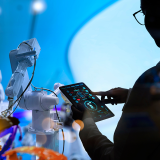
Predvídanie a riadenie vplyvu zmeny
Predvídanie a riadenie vplyvu zmeny je jednou zo šiestich hlavných aktivít pracovného programu nadácie Eurofound na obdobie 2021 – 2024. Eurofound poskytne dôkazy o štrukturálnom vývoji ovplyvňujúcom európske hospodárstvo a trhy práce, ktorého hybnou silou je predovšetkým digitalizáciaa prechod na uhlíkovo neutrálne hospodárstvo, ale aj krízaCOVID-19. Cieľom tohto výskumu je pomôcť tvorcom politík predvídať a pripraviť európske trhy práce a pracoviská na tieto zmeny.
Od roku 2021 bude Eurofound poskytovať informácie o vplyve týchto megatrendov na životné a pracovné podmienky v EÚ. V oblasti digitalizácie sa výskum zameria na vplyv na zamestnanosť a pracovné podmienky, ako aj na trh práce. Medzi zahrnuté oblasti patrí sociálny dialóg a jeho úloha pri formovaní štrukturálnych zmien, regulačné rámce, sociálna ochrana a umelá inteligencia (AI). V nadväznosti na predchádzajúci výskum práce pre platformy budú roky 2021 – 2024 príležitosťou zamerať sa na mapovanie a hodnotenie účinnosti politických iniciatív pri riešení výziev identifikovaných pri práci pre platformy.
Cieľom nadácie Eurofound bude aj podpora prechodu EÚ na uhlíkovo neutrálne hospodárstvo vrátane obehového hospodárstva a implementácie nástroja obnovy EÚ NextGenerationEU, a to pomocou skúmania sociálno-ekonomických účinkov. Patria sem zmeny zamestnania a transformácia pracovných miest a pracovných podmienok, ako aj distribučný vplyv politík v oblasti zmeny klímy. Niektoré z týchto prác budú nadväzovať na výsledky pilotného projektu o budúcnosti výroby (FOME) , ktorý uskutočnila nadácia Eurofound.
Pri pokračovaní v tejto práci počas rokov 2021 – 2024 bude Eurofound spolupracovať s rôznymi medzinárodnými organizáciami a agentúrami EÚ, napríklad s Európskou environmentálnou agentúrou (EEA) v oblasti sociálnych vplyvov politík v oblasti zmeny klímy. Okrem toho sa upevní existujúca spolupráca s ostatnými aktérmi výskumu v oblasti digitalizácie, ktorými sú Spoločné výskumné centrum (JRC), Agentúra pre základné práva (FRA) a Európska agentúra pre bezpečnosť a ochranu zdravia pri práci (EU-OSHA). Plánuje sa aj ďalšie partnerstvo s Medzinárodnou organizáciou práce (MOP) v oblasti meniaceho sa sveta práce.
- Infografika: Predvídanie a riadenie vplyvu zmien v EÚ
„Pre hospodárstvo a trhy práce EÚ je charakteristický vplyv megatrendov, najmä digitalizácie a prechodu na uhlíkovo neutrálne hospodárstvo. Dôležité je preskúmať presný spôsob fungovania týchto prechodov, čo sa mení a aký to bude mať vplyv nielen na organizácie, ale aj na pracovnú silu a spoločnosť.“
Irene Mandl, vedúca oddelenia zamestnanosti



































